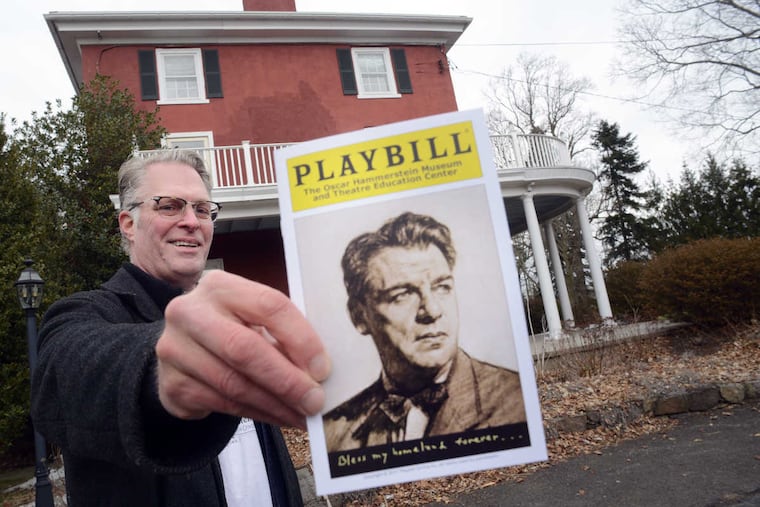Grandson seeks $2M to build Hammerstein museum on Bucks farm
In nearly 20 years at Highland Farm, the legendary lyricist wrote "South Pacific," "The King and I," "Carousel," "Oklahoma!" "The Sound of Music" -- transforming the American musical.

Will Hammerstein recently walked Highland Farm in Doylestown Township, retracing the steps his famous grandfather, Oscar Hammerstein II, took in the 1940s and '50s, immersed in pastoral tranquillity while creating the book and lyrics for South Pacific, The King and I, Carousel, and Oklahoma!, and the lyrics for The Sound of Music.
Before Hammerstein, "musicals had a thinly disguised plot that was just an excuse to give the comedy guy a chance to tell jokes and the singer a chance to sing his or her hit songs," Hammerstein, 54, said. "They were always like, we'll have a cocktail party and there's a piano in the corner of the room and someone says, 'Hey, Marilyn, why don't you sing that song you sing?' And Marilyn says, 'No, I couldn't. Well, maybe just one.' "
In 1927, teamed with composer Jerome Kern, his grandfather wrote Showboat, a groundbreaking musical that dealt with racism and tragedy, but he then spent more than a decade churning out lightweight song-and-dance shows. "A genius was writing that crap," Hammerstein said sadly.
But in 1941, the lyricist paid $23,000 for Highland Farm, where he lived with his wife, Dorothy, until his death from cancer at age 65 in 1960. It was there that he wrote the books and lyrics credited with transforming American musicals from boy-meets-girl fluff to dramas whose songs illuminated character and helped tell the story.
That is why his grandson is devoted to buying the 1840 house and the barn, and turning them into the Oscar Hammerstein II Museum and Theater Education Center. He needs $2 million to finance his dream.
"This was a working cattle farm," Hammerstein said, surveying the ancient barn and its long-vacant wooden stalls. "It'll never be a cow barn again. As an attorney who studied historic preservation, I know this barn needs to sing for its supper or fall down. It needs to be an Oscar Hammerstein museum. We need to restore the house and barn, and tell my grandfather's story."
Oscar Hammerstein's prolific collaboration with the composer Richard Rodgers began in 1943 with Oklahoma! Most of the 40 acres that inspired those lyrics — "The corn is as high as an elephant's eye" among them — were sold decades ago. Only five acres of Highland Farm remain, but the Hammerstein mystique still resides there.
Christine Cole, a Lehigh University psychology professor with a passion for historic preservation, bought the barn and the house in 2007, and lovingly restored the home, which is on the National Register of Historic Places, as her residence and as a bed and breakfast with Hammerstein-theme rooms.
"I always wanted to save the barn" as well, Cole said. "The story goes that when it was built at the turn of the 20th century, the Lenz circus family lived here and housed their elephants there. It's got holes in it and it sort of leans a little bit, but it's still pretty solid. This whole property has such a serene feeling. It's worth preserving."
Hammerstein has an agreement of sale with Cole for the house and barn, and as of last year, the approval of the Doylestown Township Zoning Board to revitalize them as an Oscar Hammerstein II museum and historic residence. After months of hearings in 2015, the board had rejected his plan to also build a 400-seat tribute theater on the site and produce his grandfather's signature musicals. "I had to get two crowns because of grinding my teeth for seven months," he said.
To come up with the $2 million needed to buy the property and plan the museum, he and his wife, Mandee, are running a series of fund-raisers at which filmmaker JoAnn Young screens her Oscar Hammerstein II documentary, Out of My Dreams, then answers questions from the audience. The most recent was last month at the Art of Sound in Lambertville, N.J., across the bridge from New Hope; the next one is May 3 at the County Theater in Doylestown. Since last November, they have brought in $200,000.
Once he acquires the property, Hammerstein said, he'll need several million dollars more to rebuild the barn as a museum. He said he's as undaunted by the prodigious fund-raising effort ahead as he was by those months of zoning board hearings.
"I'm a baseball player," Hammerstein said. "When you strike out in the first inning, you don't go home. You could strike out three times and then win the game in the ninth. This is the same patch of dirt where Oscar Hammerstein paced, dreaming up his lyrics. That's hardcore."
Inside the antiques-furnished farmhouse, he watched Mandee at the grand piano, holding their 8-month-old son, Oscar IV, who composed his own tunes by pressing one key at a time.
"We're Hammersteins, we're obsessives," he said. "We have patience and stubbornness and determination. We will complete the vision."